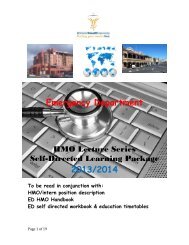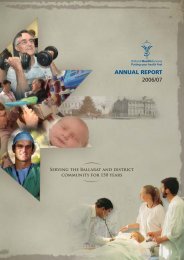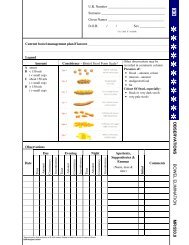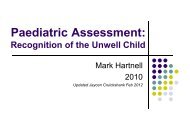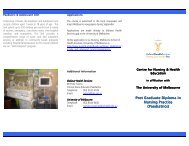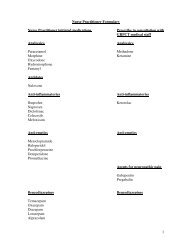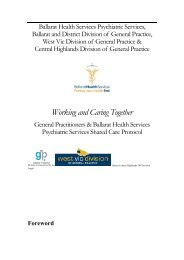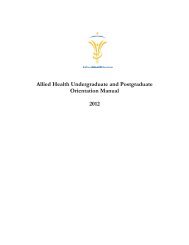Quality of Care Report - Ballarat Health Services
Quality of Care Report - Ballarat Health Services
Quality of Care Report - Ballarat Health Services
Create successful ePaper yourself
Turn your PDF publications into a flip-book with our unique Google optimized e-Paper software.
Infection ControlMonitoring our Infection RatesWe track our Infection rates to checkour progress in the fight againstinfection.Data is submitted on wound infectionsand antibiotic use to the VictorianNosocomial Infection SurveillanceSystem (VICNISS). These reports enableus to compare our performance withother hospitals in the state. During theyear BHS achieved excellent results inthe VICNISS review. However, we stillhave room for improvement withantibiotic choice and timing withsurgery. Strategies to improve thisinclude dissemination <strong>of</strong> antibioticguidelines to all doctors, education andtabling <strong>of</strong> reports at surgical forums.The VICNISS Type 1 indicatorsmonitored at BHS include:• Surgical site infections followingbowel surgery;• Surgical site infections following hipand knee surgery;• Blood stream infections associatedwith the use <strong>of</strong> central lines in theIntensive <strong>Care</strong> Unit; and• Haemodialysis surveillance.The results for these indicators werewithin the expected limits for ourhealth service.Achievements• A consistent zero infection rate in theICU in relation to central lineassociated blood stream infections(CLABSI) over the last four years sincethe commencement <strong>of</strong> the VICNISSsurveillance.• Multi-Resistant Organism surveillance(Golden Staph). The incidence <strong>of</strong>MRSA (‘Golden Staph’) infection rateis kept very low by:• hand hygiene practices;• adhering to precautions such aswearing gloves and gowns;• nursing patients with a resistantorganism separate to other patients;• screening patients for MRSAroutinely when transfered frommetropolitan hospitals;• maintaining currentpolicies/guidelines for management<strong>of</strong> MRSA; and• educating staff and visitors.These routine procedures limitinfections moving from patient topatient. Most <strong>of</strong> the MRSA (’goldenstaph’) infections seen at BHS havebeen acquired either in the communityor at other hospitals and there hasbeen no transmission <strong>of</strong> infectionwithin our hospital.Clean hands at <strong>Ballarat</strong> <strong>Health</strong> <strong>Services</strong>Research shows compliance with hand hygiene is poor.Common reasons include lack <strong>of</strong> time, lack <strong>of</strong> sinks, skin irritationand dryness and inadequate knowledge <strong>of</strong> guidelines or protocolsfor hand hygiene.As part <strong>of</strong> a DHS funded state wide project to address thisissue, we have introduced the Hand Hygiene Project.Don’t Get Caught Dirty Handed• Aiming to provide staff with a computerbased credentialing program.• Providing hand care and dermatological support.• A major focus this year will be to encourage patientsand visitors to clean their hands before touching patients by:Having hand rub readily available at all public entrancesand wards;Having clear signage regarding appropriate use <strong>of</strong>the hand rub; andProviding hand hygiene pamphlets throughout the facility.<strong>Ballarat</strong> <strong>Health</strong> <strong>Services</strong> <strong>Quality</strong> <strong>of</strong> <strong>Care</strong> <strong>Report</strong> 2007-08 32




